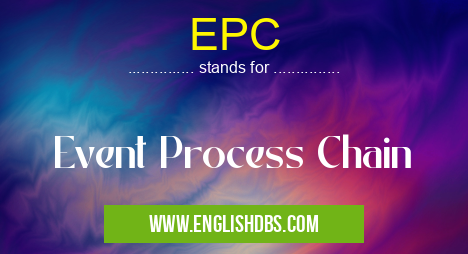What does EPC mean in UNCLASSIFIED
EPC stands for Event Process Chain, and is a concept used in business process modeling. It is an important part of understanding how a particular business process works and examining how changes to the process might affect the entire system. In this article we will discuss what EPC is, how it works, and why it is important.

EPC meaning in Unclassified in Miscellaneous
EPC mostly used in an acronym Unclassified in Category Miscellaneous that means Event Process Chain
Shorthand: EPC,
Full Form: Event Process Chain
For more information of "Event Process Chain", see the section below.
What Is An EPC
An Event Process Chain (EPC) is an organizational structure for representing and analyzing workflows or processes within an enterprise system. Essentially, it uses a graph-based representation of activities by showing which activities are linked together in the workflow to create a complete picture of operations from start to finish. Each node within the chain represents a data object, decision or action that needs to occur in order for the entire operation to be successful. The arrows connecting each node represent flows of control that must occur between different events in order for the whole operation to be completed.
How Does an EPC Work
An EPC diagram consists of nodes and connectors which are connected together. The nodes are made up of events which can either be start or end points, start/end points associated with basic control flow functions such as branching or looping back around, data objects acting as sources or sinks for inputs/outputs throughout the workflow, decisions points where rules based logic can be applied, and actions which execute certain tasks during the execution of the workflow. Connectors link all these nodes together to form an event process chain (EPC). They indicate directionality (inputs & outputs) between activities in a workflow.
Why Is An EPC Important
Using an Event Process Chain (EPC) helps organizations understand their existing processes on multiple levels; from detailing individual task dependencies through to showing overall system architecture patterns as well as risk points in existing processes that may need proactive management plans put into place. This approach can also help organizations design new processes more quickly by giving insight into what needs connecting when creating new workflows or scenarios so they can reduce complexity while still ensuring optimal performance around their operations.
Essential Questions and Answers on Event Process Chain in "MISCELLANEOUS»UNFILED"
What is an EPC?
An EPC, or Event Process Chain, is a diagram that visualizes the flow of a process from beginning to end. It breaks down the steps in an organized manner and can be used for analysis and optimization of business processes.
How does an EPC work?
An EPC is made up of individual items called events which are connected to one another via arrows showing the direction of data flow. These events create a chain of interactions between different actors and systems which take place during the process.
Are there any specific rules when creating an EPC?
Yes, there are some general guidelines that should be followed when creating an Event Process Chain. These include specifying objectives for each event, designing a comprehensive data model, assigning roles for participants in the process, defining tasks for each actor involved and generating necessary output files. Additionally, it's important to clearly distinguish between data sources and destinations as well as define triggers for initiating activities in the chain.
What types of diagrams can be used in an EPC?
Generally speaking, Event Process Chains may contain several types of diagrams such as activity diagrams, sequence diagrams, statechart diagrams and interaction overview diagrams to name just a few. All these help capture different aspects of how information flows through a process over time.
What tools can be used to create EPCs?
There are many tools available to help design and maintain effective Event Process Chains such as Microsoft Visio or IBM Rational System Architect. Both provide graphical editors which allow you to easily create different types of flowcharts with ease. Additionally they also provide functionality for simulation and testing various scenarios within the process.
What are some benefits of using an EPC?
Event Process Chains offer several advantages when dealing with complex processes such as increased visibility into how all activities within the system interact with one another; improved resource utilization; enhanced coordination between stakeholders; better performance monitoring; enhanced communication between teams; faster issue resolution combined with improved customer satisfaction rates.
How often should I review my existing EPCs?
It's highly recommended that you regularly review your existing Event Process Chains at least once every quarter in order to keep them up-to-date and ensure they are performing optimally given your current environment.
Can I share my created EPCs?
Yes absolutely! An added benefit of using specialist software such as Microsoft Visio or IBM Rational System Architect is that you are able to share your designs matrix style within larger organizations or even across multiple sites by making use of their collaboration features.
EPC also stands for: |
|
| All stands for EPC |
